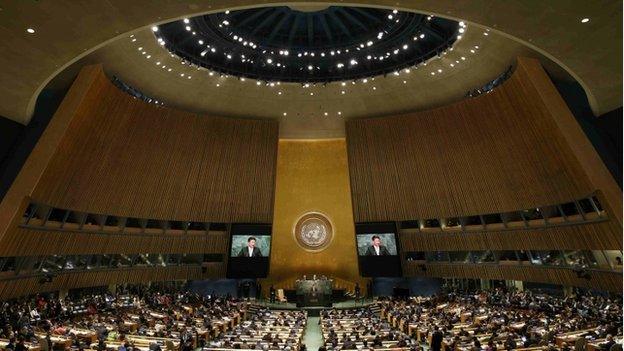Campaign warns 11% of world illiterate
- Published

The United Nations general assembly is setting new global education targets
A coalition of charities and businesses is calling on world leaders to make tackling illiteracy a global priority.
The Project Literacy alliance says that 11% of the world's population remains unable to read or write.
The campaign is lobbying leaders attending the United Nations general assembly in New York, which has been setting global education targets.
"The curse of illiteracy is global and devastating," said campaign spokeswoman Kate James.
The Project Literacy campaign says it is creating a virtual "petition" on behalf of 757 million people who cannot write their own name.
'Inequality, poverty and disease'
The partnership brings together charities such as the National Literacy Trust, BookAid and Room to Read, along with education businesses such as Pearson.

Blank boxes and empty posters on behalf of more than 757 million illiterate people
The campaign says that illiteracy is a major barrier to economic development, costing $1.19 trillion (£1.25tn) per year.
Global education targets, such as the goal of providing primary education for all, have been set since 1990.
But the campaign says that in sub-Saharan Africa, there are 37% more illiterate adults than there were in 1990.
The project highlights the gender gap in who is taught to read and write. Women represent about five in seven of those who are illiterate around the world.
The campaign argues that literacy is linked to better health, reducing crime, job opportunities and democratic engagement.
There are 32 million illiterate adults in the United States and more than 70% of the US prison population have the literacy levels of a nine-year-old or lower.
The impact of illiteracy was "inequality, poverty and disease", said Ms James.
World leaders have been gathering at the United Nations to approve global development targets - the sustainable development goals.
These replace pledges made in the millennium year.
Although some progress was made, none of the targets for education, such as universal primary education, were fully achieved by the deadline of 2015.